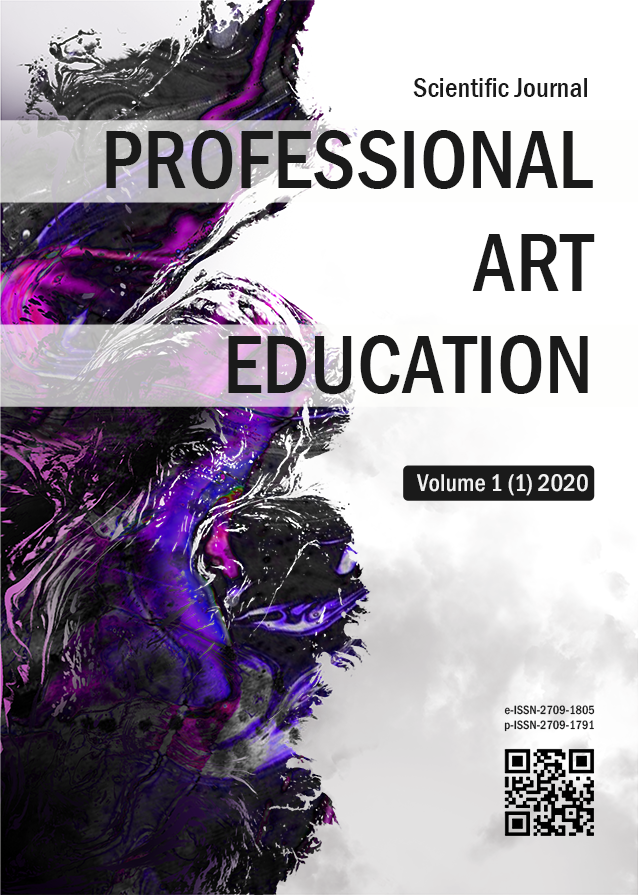The Influence of National Ideas of T. Shevchenko on the Ukrainian Choral Culture of the Late XIX – Early XX Centuries
DOI:
https://doi.org/10.34142/27091805.2020.1.01.01Keywords:
national ideas, Ukrainian choral culture, choral music, educational institutions, SchevchenkoAbstract
Object. The objective of this article is studying the influence of T. Shevchenko’s national ideas on the development of student choir movement in Ukraine during the period of the late ХІХ and early XX centuries. Methods. The traditional historical and pedagogical research methods were used in the work: analytical, historical and comparative, retrospective, comparative analysis of scientific and pedagogical literature, archival documents, educational materials. Results of the scientific research show that the problem of youth national education has attracted many people of arts and culture such as F. Prokopovych, O. Duhnovych, M. Dragamanov, M. Grushevsky. It is still in the center of attention of contemporary scientists in the field of theory and practice of higher school pedagogic – O. Vyshnevsky, O. Lubar, O. Morozov, Y. Rudenko, M. Stelmahovych, M. Shkil. Nevertheless, the ideas of student youth national education by means of choir music on Shevchenko’s lyrics have not been the subject of consolidated historical and pedagogical research. Summarizing theoretical studies in literature, the author highlighted the main postulates of Shevchenko`s national creed – this are patriotism, revolt against national slavery and political pressure, struggle for national independence, extermination of the national inferiority psychology, defense of national interests, national language, and culture. According to the historical and pedagogical analysis of the chosen period choral groups/choirs have proved to be the centers of youth national education. They were created at universities
(Kyiv, Kharkov, Odessa), gymnasiums, educational and musical societies («Prosvita», «Boyan», «Torban», «Ukrainsky club»). Leading Ukrainian composers and musicians O. Koshyts, M. Leontovych, M. Lysenko, S.Luydkevych, K. Stetsenko, L. Revutsky, Y. Stepovy, Y.Yatsynevych headed the national choir movement and as a rule organized and conducted a great number of choirs at educational institutions. Inspired by T. Shevchenko’s national ideas they made such distinguished choral compositions as musical cycle «Music for Kobzar by T. Shevchenko» by M. Lysenko (more than 80 diversepieces of vocal and choral genre), cantata-symphony «Caucuses» by S. Lyunkevych, cantata «Kerchief», «Why are you blackened» by L. Revutsky, «Tara’s night» by Y. Kyshakevych, «Blaze of Lights», «Thickets ways thorns ...» by S. Vorobkevych. Being a part of student’s choir repertoire musical compositions based on Shevchenko’s works raised and promoted the national awareness, patriotism, social ideology, interests to national history. Conclusions. At the end of the 19th and beginning of the 20th centuries, a choral movement was actively developing on Ukrainian lands, led by leading Ukrainian composers and musicians. Inspired by the national-patriotic work of the great Kobzar, they created vivid choral compositions filled with civilian sound. Amateur and student choirs actively promoted Ukrainian choral art, among which works on the words of T. Shevchenko occupied an honorable place, which preserved the national face of the people and filled spiritual voids in the cultural space of the then society.
Downloads
References
Березівська, Л. Л. (1998). Проблеми освіти та виховання в діяльності київських просвітницьких това-риств (друга половина ХІХ – початок ХХ ст.). (Дис. канд. пед. наук). Інститут педагогіки АПН України, Київ.
Бондар С.В., Огродник І.В., Русин М.Ю., (2008). Історія української філософії: підручник. Київ: ВПЦ «Київський університет».
Василюк, В. І. (2009). Національна ідея у творчості Т. Шевченка, Вітражі. Збірник матеріалів виклада-цько-студентських наукових читань. Житомир: ЖДУ імені Івана Франка. 50-54.
Волосюк І. (2004). Націотворча концепція у посланні «І мертвим, і живим, і ненародженим…» Т. Шев-ченка. Шевченкознавчі студії: Збірник наукових праць, 71-73.
Грица, С.Й., Загайкевич, М.П., Калениченко, & Пархоменко Л.О. (1990). Історія української музики: кінець ХІХ – початок ХХ ст. М.П. Загайкевич (Ред.). Київ: Наукова думка.
Грищенко Т. А. (1998). Становлення та розвиток музично-естетичного виховання в гімназіях Украї-ни (XIX – початок ХХ ст.). (Дис. канд. пед. наук). Інститут проблем виховання АПН України, Київ. Клочек, Г. (2001, травень 17). До істинного Тараса Шевченка. Літературна Україна, 2.
Лошков Ю.І., (2014). Музична освіта в Україні: специфіка становлення. Час мистецької освіти, 120–128.
Михайличенко, О.В. (2005). Музично-педагогічна діяльність українських композиторів та виконав-ців другої половини ХІХ – початку ХХ ст. (історичні нариси). Суми: Мрія. 1.
Сенета Т. В. (2017). Роль творчості М.Д. Леонтовича у становленні української культури ХХ століття. Молодий вчений, 4.2 (44.2), 74-77.
Смирнова Т.А., (2015). Вища мистецька освіта: на шляху до інновацій. Мистецька освіта: історія, те-орія, технології, 84-90.
Downloads
Published
License
Copyright (c) 2020 Оксана Васильєва (Автор)

This work is licensed under a Creative Commons Attribution-NonCommercial 4.0 International License.















